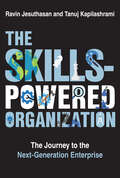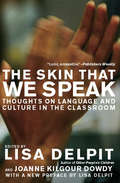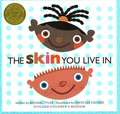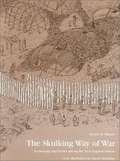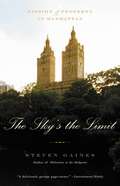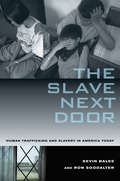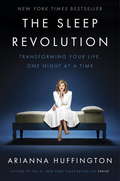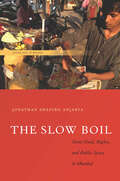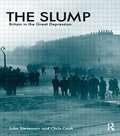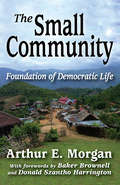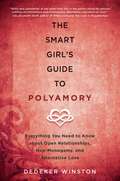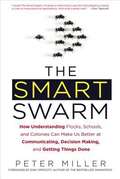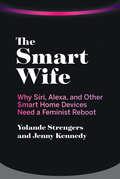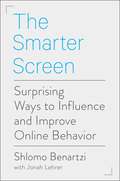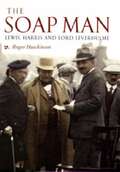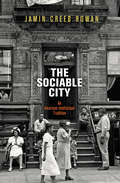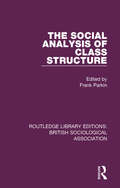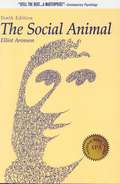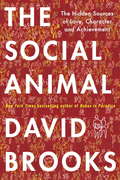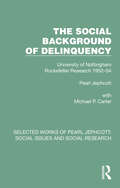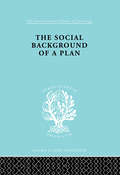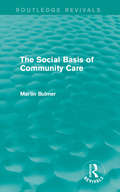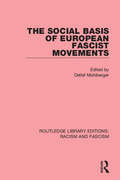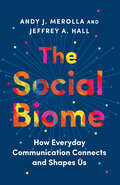- Table View
- List View
The Skills-Powered Organization: The Journey to the Next-Generation Enterprise
by Ravin Jesuthasan Tanuj KapilashramiHow to design and activate the skills-based enterprise that is pivotal for navigating the &“next&” of work.As the world navigates the rapid and disruptive effects of AI, climate change, and geopolitical conflicts, the world of work, too, needs to change. Jobs are giving way to skills as the currency of work to ensure a more agile, resilient, and flexible enterprise that cannot just respond but must thrive in the face of these challenges. This pivot from jobs to skills will require us to rethink everything we know about work. Building on his bestselling book Work without Jobs, Ravin Jesuthasan returns, this time with coauthor Tanuj Kapilashrami, an international human resources leader, to provide the framework organizations need to thrive in a world demanding perpetual reinvention.Many business and management books focus on individual skills and competencies, the power of AI to make companies more agile through enabling &“internal gigs,&” and the societal and policy implications of the external gig economy. The cases in The Skills-Powered Organization, however, discuss how leading companies are reinventing themselves to be skills-based organizations and transforming value for customers, communities, and stakeholders. Jesuthasan and Kapilashrami describe the need for new organizational capabilities like work design and AI-driven resourcing, as well as the need to reinvent current work systems, to realize the agility, productivity, and value-creating potential of an organization where skills are at the center of its operating model.Providing a step-by step guide for both new and seasoned leaders, this practical and informative book shows just how to future-proof organizations for the post–fourth industrial revolution world.
The Skin That We Speak: Thoughts on Language and Culture in the Classroom
by Lisa Delpit&“Lucid, accessible&” research on classroom language bias for educators and &“parents concerned about questions of power and control in public schools&” (Publishers Weekly). In this collection of twelve essays, MacArthur Fellow Lisa Delpit and Kent State University Associate Professor Joanne Kilgour Dowdy take a critical look at the issues of language and dialect in the education system. The Skin That We Speak moves beyond the highly charged war of idioms to present teachers and parents with a thoughtful exploration of the varieties of English spoken today. At a time when children who don&’t speak formal English are written off in our schools, and when the class- and race-biased language used to describe those children determines their fate, The Skin That We Speak offers a cutting-edge look at this all-important aspect of education. Including groundbreaking work by Herbert Kohl, Gloria J. Ladson-Billings, and Victoria Purcell-Gates, as well as classic texts by Geneva Smitherman and Asa Hilliard, this volume of writing is what Black Issues Book Review calls &“an essential text.&” &“The book is aimed at helping educators learn to make use of cultural differences apparent in language to educate children, but its content guarantees broader appeal.&” —Booklist &“An honest, much-needed look at one of the most crucial issues in education today.&” —Jackson Advocate
The Skin You Live In
by Michael Tyler David Lee CsicskoWith the ease and simplicity of a nursery rhyme, this lively story delivers an important message of social acceptance to young readers. Themes associated with child development and social harmony, such as friendship, acceptance, self-esteem, and diversity are promoted in simple and straightforward prose. Vivid illustrations of children's activities for all cultures, such as swimming in the ocean, hugging, catching butterflies, and eating birthday cake are also provided. This delightful picturebook offers a wonderful venue through which parents and teachers can discuss important social concepts with their children.
The Skulking Way of War: Technology and Tactics among the New England Indians
by Patrick M. MaloneDuring the brutal and destructive King Philip's War, the New England Indians combined new European weaponry with their traditional use of stealth, surprise, and mobility.
The Sky's the Limit: Passion and Property in Manhattan
by Steven GainesOutlandish displays of ego, outrageous behavior, blood feuds, status hunger, and conspicuous consumption dominate the realm of New York City luxury real estate. THE SKY'S THE LIMIT offers the ultimate look inside the world of the super-rich from Barbra Streisand, Jerry Seinfeld, and Gloria Vanderbilt to Steven Spielberg, Tommy Hilfiger, and Madonna as it reveals the amazing lengths to which some people will go to live in the right zip code.
The Slave Next Door: Human Trafficking and Slavery in America Today
by Kevin Bales Ron SoodalterIn this riveting book, authors and authorities on modern day slavery Kevin Bales and Ron Soodalter expose the disturbing phenomenon of human trafficking and slavery that exists now in the United States. In The Slave Next Door we find that slaves are all around us, hidden in plain sight: the dishwasher in the kitchen of the neighborhood restaurant, the kids on the corner selling cheap trinkets, the man sweeping the floor of the local department store. In these pages we also meet some unexpected slaveholders, such as a 27-year old middle-class Texas housewife who is currently serving a life sentence for offences including slavery. Weaving together a wealth of voices--from slaves, slaveholders, and traffickers as well as from experts, counselors, law enforcement officers, rescue and support groups, and others--this book is also a call to action, telling what we, as private citizens, can do to finally bring an end to this horrific crime.
The Sleep Revolution: Transforming Your Life, One Night at a Time
by Arianna HuffingtonWe are in the midst of a sleep deprivation crisis, writes Arianna Huffington, the co-founder and editor in chief of The Huffington Post. And this has profound consequences - on our health, our job performance, our relationships and our happiness. What is needed, she boldly asserts, is nothing short of a sleep revolution. Only by renewing our relationship with sleep can we take back control of our lives. In her bestseller Thrive, Arianna wrote about our need to redefine success through well-being, wisdom, wonder, and giving. Her discussion of the importance of sleep as a gateway to this more fulfilling way of living struck such a powerful chord that she realized the mystery and transformative power of sleep called for a fuller investigation. The result is a sweeping, scientifically rigorous, and deeply personal exploration of sleep from all angles, from the history of sleep, to the role of dreams in our lives, to the consequences of sleep deprivation, and the new golden age of sleep science that is revealing the vital role sleep plays in our every waking moment and every aspect of our health - from weight gain, diabetes, and heart disease to cancer and Alzheimer's. In The Sleep Revolution, Arianna shows how our cultural dismissal of sleep as time wasted compromises our health and our decision-making and undermines our work lives, our personal lives -- and even our sex lives. She explores all the latest science on what exactly is going on while we sleep and dream. She takes on the dangerous sleeping pill industry, and all the ways our addiction to technology disrupts our sleep. She also offers a range of recommendations and tips from leading scientists on how we can get better and more restorative sleep, and harness its incredible power. In today's fast-paced, always-connected, perpetually-harried and sleep-deprived world, our need for a good night's sleep is more important - and elusive -- than ever. The Sleep Revolution both sounds the alarm on our worldwide sleep crisis and provides a detailed road map to the great sleep awakening that can help transform our lives, our communities, and our world.From the Hardcover edition.
The Slow Boil: Street Food, Rights and Public Space in Mumbai
by Jonathan AnjariaStreet food vendors are both a symbol and a scourge of Mumbai: cheap roadside snacks are enjoyed by all, but the people who make them dance on a razor's edge of legality. While neighborhood associations want the vendors off cluttered sidewalks, many Mumbaikers appreciate the convenient bargains they offer. In The Slow Boil, Jonathan Shapiro Anjaria draws on his long-term fieldwork with these vendors to make sense of the paradoxes within the city and, thus, to create a better understanding of urban space in general. Much urban studies literature paints street vendors either as oppressed and marginalized victims or as inventive premoderns. In contrast, Anjaria acknowledges that diverse political, economic, historic, and symbolic processes create contradictions in the vendors' everday lives, like their illegality and proximity to the state, and their insecurity and permanence. Mumbai's disorderly sidewalks reflect the simmering tensions over livelihood, democracy, and rights that are central to the city but have long been overlooked. In The Slow Boil, these issues are not subsumed into a larger framework, but are explored on their own terms.
The Slump: Britain in the Great Depression (3rd edition)
by John Stevenson Chris CookThe Slump: Britain in the Great Depression takes an illuminating look back at the 1930s - the decade of depression and economic crisis in the twentieth century. Contains a new introduction, framing the historical narrative in the light of recent scholarship and discussing relevant new research A substantial final chapter which places the 1930s in historical context and highlights parallels and similarities to the current crisis and others that have occurred since the '30s. Statistical tables integrated throughout the text Illustrations in a plate section A revised and extended bibliography to include major new publications since the last edition
The Small Community: Foundation of Democratic Life
by Arthur E. MorganIn this age of large cities, mass culture, and ever more massive events, people must struggle against an overwhelming crowd of their own creations to maintain human integrity. In this manual for human survival, Arthur E. Morgan offers a solution: peaceful existence in the small, primary community where, more easily than anywhere else, people can find a way to live well. Ultimately striving to show that the small community is the lifeblood of civilization, this volume examines the political organization, membership, economics, health, and ethics characteristics of small communities.Like Rousseau before him, Morgan observes that we have less control over our affairs than in the past. In increasing our control of the natural environment, human beings have built a social environment so out of scale that it becomes nearly impossible for people to maintain balance. The struggle now is less with the natural order than with the social order, and preserving human integrity against the plethora of our own creations is the core problem.The need to rediscover elementary forms of human existence has been accelerated by the efficiencies of centralized control and mass persuasion. In the face of this, small communities or intimate groups become the primary pattern in which human beings must live if the good life is to be a realistic goal. The timely nature of this volume has grown as the electronic displaces the mechanical as a moral rival to human community.
The Smart Girl's Guide to Polyamory: Everything You Need to Know About Open Relationships, Non-Monogamy, and Alternative Love
by Dedeker WinstonNo one likes a know-it-all, but everyone loves a girl with brains and heart. The Smart Girl's Guide to Polyamory is an intelligent and comprehensive guide to polyamory, open relationships, and other forms of alternative love, offering relationship advice radically different from anything you'll find on the magazine rack.This practical guidebook will help women break free of the mold of traditional monogamy, without the constraints of jealousy, possessiveness, insecurity, and competition. The Smart Girl's Guide to Polyamory incorporates interviews and real-world advice from women of all ages in nontraditional relationships, as well as exercises for building self-awareness, confidence in communication, and strategies for managing and eliminating jealousy. If you're curious about exploring group sex, opening up your current monogamous relationship, or ready to "come out” as polyamorous, this book covers it all!Whether you're a seasoned graduate, a timid freshman, or somewhere in between, you'll learn how to discover and craft unique relationships that are healthy, happy, sexy, and tailor-made for you. Because when it comes to your love life, being a know-it-all is actually a great thing to be.
The Smart Girls Handbook: How to Silence Self-doubt, Find Your Purpose and Redefine the Impossible
by Scarlett V ClarkUsing her own story alongside the most popular questions that Scarlett is asked at the many events she runs in schools and colleges, The Smart Girl’s Handbook will show you how to:•Discover your talent and find your passion.•Learn how to deal with fear of failure.•Cope with anxiety and start speaking your truth.•Build a strong group of true friends and slay the naysayers.•Be confident and love yourself.Each chapter follows the themes above and uses examples from Scarlett’s own life to explore the centralidea. Included are tools, tips and exercises to work through, as well as interviews with other "Smart Girls".This is a handbook for any girl who wants to push boundaries and go for what they want.
The Smart Swarm
by Peter MillerWhat ants, bees, fish, and smart swarms can teach about communication, organization, and decision-making. The modern world may be obsessed with speed and productivity, but twenty-first-century humans actually have much to learn from the ancient instincts of swarmers. A fascinating new take on collective intelligence and its colorful manifestations in some of our most complex problems, The Smart Swarm introduces a compelling new understanding on solving our own problems relating to such topics as business, politics, and technology. This lively tour from National Geographic reporter Peter Miller introduces ant colonies that have been the inspiration for streamlining factory processes, telephone networks, and truck routes; termites, used in studies for climate-control solutions; schools of fish, on which the U.S. military modeled a team of robots; and many other examples of the wisdom to be gleaned about the behavior of crowds.
The Smart Wife: Why Siri, Alexa, and Other Smart Home Devices Need a Feminist Reboot
by Yolande Strengers Jenny KennedyA bold dive into the problematic development (and developers) of "smart wives"--feminized digital assistants who are friendly, sometimes flirty, docile, efficient, occasionally glitchy, and perpetually available. Meet the Smart Wife--at your service, an eclectic collection of feminized AI, robotic, and smart devices. This digital assistant is friendly and sometimes flirty, docile and efficient, occasionally glitchy but perpetually available. She might go by Siri, or Alexa, or inhabit Google Home. She can keep us company, order groceries, vacuum the floor, turn out the lights. A Japanese digital voice assistant--a virtual anime hologram named Hikari Azuma--sends her "master" helpful messages during the day; an American sexbot named Roxxxy takes on other kinds of household chores. In The Smart Wife, Yolande Strengers and Jenny Kennedy examine the emergence of digital devices that carry out "wifework"--domestic responsibilities that have traditionally fallen to (human) wives. They show that the principal prototype for these virtual helpers--designed in male-dominated industries--is the 1950s housewife: white, middle class, heteronormative, and nurturing, with a spick-and-span home. It's time, they say, to give the Smart Wife a reboot.
The Smarter Screen
by Jonah Lehrer Shlomo BenartziA leading behavioral economist shows how businesses can improve consumer thinking and decision-making on screens.The typical American office worker now spends the majority of his or her waking hours staring at a screen. In the 21st century, every business is a digital business, which is why it's so critical to understand how we think and behave online.Acclaimed behavioral economist Shlomo Benartzi reveals a toolkit of interventions for the digital age. Using provocative case-studies and engaging reader exercises, Benartzi shows how businesses can update their nudges to help consumers make better decisions on screens.Consider these solutions:The tournament model used for Wimbledon and March Madness may help consumers identify what they want more easily. While most websites attempt to display as many options as possible, if people can select options from manageable rounds they tend to make better choices.People are more willing to tell a gadget the truth about their risky health behaviors than an actual doctor. When dealing with sensitive subjects, the absence of human feedback - an absence made easy in an age of screens and machines - can be a great advantage.The precise location of an option on a screen can have a massive impact on consumer choice. (In some instances, screen location matters more than personal preference.) The same logic also applies to information, as certain layouts can dramatically influence our levels of attention.Although most websites are designed to make the act of reading as easy as possible, Benartzi explains why this can be a big mistake. Sometimes, the careful use of ugly fonts and other forms of "visual disfluency" are an important way to boost reading comprehension and retention.This book will help you transform the challenges of the digital world into powerful new opportunities that will drive your success in an age of screens.
The Soap Man: Lewis, Harris and Lord Leverhulme
by Roger HutchinsonThe true story of a tycoon&’s dashed dream: &“A wonderful little book about what happens when righteous ambition meets stubborn culture.&” —Scotland on SundayShortlisted for the Saltire Scottish Book of the Year Award In 1918, as the First World War was drawing to a close, the eminent industrialist Lord Leverhulme, whose name lives on today within the multinational company Unilever, bought—lock, stock and barrel—the Hebridean island of Lewis. His intention was to revolutionize the lives and environments of its thirty thousand people, and those of neighboring Harris, which he shortly added to his estate. For the next five years, a state of conflict reigned in the Hebrides. Island seamen and servicemen returned from the war to discover a new landlord whose declared aim was to uproot their identity as independent crofter/fishermen and turn them into tenured wage-owners. They fought back, and this is the story of that fight. The confrontation resulted in riot and land seizure and imprisonment for the islanders and the ultimate defeat for one of the most powerful men of his day. The Soap Man paints a beguiling portrait of the driven figure of Lord Leverhulme, but also looks for the first time at the infantry of his opposition: the men and women of Lewis and Harris who for long hard years fought the law, their landowner, local business opinion, and the media, to preserve the settled crofting population of their islands. &“Magnificent.&” —West Highland Free Press
The Sociable City: An American Intellectual Tradition (The Arts and Intellectual Life in Modern America)
by Jamin Creed RowanWhen celebrated landscape architect Frederick Law Olmsted despaired in 1870 that the "restraining and confining conditions" of the city compelled its inhabitants to "look closely upon others without sympathy," he was expressing what many in the United States had already been saying about the nascent urbanization that would continue to transform the nation's landscape: that the modern city dramatically changes the way individuals interact with and feel toward one another. An antiurbanist discourse would pervade American culture for years to come, echoing Olmsted's skeptical view of the emotional value of urban relationships. But as more and more people moved to the nation's cities, urbanists began to confront this pessimism about the ability of city dwellers to connect with one another.The Sociable City investigates the history of how American society has conceived of urban relationships and considers how these ideas have shaped the cities in which we live. As the city's physical and social landscapes evolved over the course of the late nineteenth and twentieth centuries, urban intellectuals developed new vocabularies, narratives, and representational forms to express the social and emotional value of a wide variety of interactions among city dwellers.Turning to source materials often overlooked by scholars of urban life—including memoirs, plays, novels, literary journalism, and museum exhibits—Jamin Creed Rowan unearths an expansive body of work dedicated to exploring and advocating the social configurations made possible by the city. His study aims to better understand why we have built and governed cities in the ways we have, and to imagine an urban future that will effectively preserve and facilitate the interpersonal associations and social networks that city dwellers need to live manageable, equitable, and fulfilling lives.
The Social Analysis of Class Structure (Routledge Library Editions: British Sociological Association #15)
by FRANK ParkinOriginally published in 1974, The Social Analysis of Class Structure is an edited collection addressing class formation and class relations in industrial society. The range and variety of the contributions provide a useful guide to the central concerns of British sociology in the 1970s. Encompassing general theorizing and empirical investigation, the book examines the treatment of crucial issues of the day, such as the relationships between race and class formation, and sexual subordination, as well addressing historical questions such as the Victorian labour aristocracy and the incorporation of the working class.
The Social Animal (10th edition)
by Elliot Aronson Joshua AronsonThis book is a brief, compelling introduction to modern social psychology. Through vivid narrative, lively presentations of important research, and intriguing examples, Elliot Aronson probes the patterns and motives of human behavior, covering such diverse topics as terrorism, conformity, obedience, politics, race relations, advertising, war, interpersonal attraction, and the power of religious cults.
The Social Animal: The Hidden Sources of Love, Character, and Achievement
by David Brooks#1 NEW YORK TIMES BESTSELLER. With unequaled insight and brio, New York Times columnist David Brooks has long explored and explained the way we live. Now Brooks turns to the building blocks of human flourishing in a multilayered, profoundly illuminating work grounded in everyday life. This is the story of how success happens, told through the lives of one composite American couple, Harold and Erica. Drawing on a wealth of current research from numerous disciplines, Brooks takes Harold and Erica from infancy to old age, illustrating a fundamental new understanding of human nature along the way: The unconscious mind, it turns out, is not a dark, vestigial place, but a creative one, where most of the brain's work gets done. This is the realm where character is formed and where our most important life decisions are made--the natural habitat of The Social Animal. Brooks reveals the deeply social aspect of our minds and exposes the bias in modern culture that overemphasizes rationalism, individualism, and IQ. He demolishes conventional definitions of success and looks toward a culture based on trust and humility. The Social Animal is a moving intellectual adventure, a story of achievement and a defense of progress. It is an essential book for our time--one that will have broad social impact and will change the way we see ourselves and the world.BONUS: Includes new material.s an essential book for our time, one that will have broad social impact and will change the way we see ourselves and the world.
The Social Background of Delinquency (Selected Works of Pearl Jephcott: Social Issues and Social Research)
by Pearl JephcottWritten in 1954 and published here for the first time, The Social Background of Delinquency deals with the social climate in which juvenile delinquency crops up time after time. It examines ‘bad’ behaviour among people who could otherwise be classed as ‘normal’ members of ordinary English society. It attempts to explore certain aspects of the sub-cultures within respectable society which appear to breed behaviour officially classed as ‘delinquent’. The research is based on a working-class town in the Midlands with a high proportion of miners and observes a pair of similar streets in five areas of the town. Each pair of streets containing one delinquency-free and one with a history of trouble. Not content with a mere survey, the research design is multifaceted and includes ethnographic observations, key informant interviews, personal history analyses and 'the playroom method' explicitly designed to ascertain children's views. The findings are reported here and represent a snapshot of life in the 1950s.
The Social Background of a Plan: A Study of Middlesbrough (International Library of Sociology)
by Ruth GlassFirst Published in 1998. Routledge is an imprint of Taylor & Francis, an informa company.
The Social Basis of Community Care (Routledge Revivals)
by Martin BulmerCare for the elderly, disabled and mentally-ill within and by the community forms a vital part of current social policy. Martin Bulmer argues that this policy is inadequately thought out and rests on a series of poorly founded sociological assumptions. As a result there is a vacuum at the heart of government’s social care policy which is likely to lead to ineffective or deteriorating provision for those in need. This book, first published in 1987, will be essential reading for all those concerned with the organization and delivery of social care, whether as students, practitioners or teachers. It will be particularly useful for courses dealing with social policy, the personal social services and the social context of social work.
The Social Basis of European Fascist Movements (Routledge Library Editions: Racism and Fascism)
by Detlef MühlbergerBetween 1919 and 1945 most countries in Europe spawned some form of fascism. Some have become considerably more notorious than others: this book, first published in 1987, sets out to analyse the social forces that went into the making of the fascist parties of the major European countries and to show the similarities and differences in their constitution as well as to suggest reasons for their different degrees of penetration and success. Few books have surveyed the whole field; the team of contributors engaged in the present enterprise offer a systematic and thorough survey of the social characteristics of European fascist movements, a subject of central importance to social and political history.
The Social Biome: How Everyday Communication Connects and Shapes Us
by Jeffrey A. Hall Andy J. MerollaA deep dive into the importance of daily communication and how we can harness its power to create a better life We spend much of our waking lives communicating with others. How does each moment of interaction shape not only our relationships but also our worldviews? And how can we create moments of connection that improve our health and well-being, particularly in a world in which people are feeling increasingly isolated? Drawing from their extensive research, Andy J. Merolla and Jeffrey A. Hall establish a new way to think about our relational life: as existing within &“social biomes&”—complex ecosystems of moments of interaction with others. Each interaction we have, no matter how unimportant or mundane it might seem, is a building block of our identities and beliefs. Consequently, the choices we make about how we interact and who we interact with—and whether we interact at all—matter more than we might know. Merolla and Hall offer a sympathetic, practical guide to our vital yet complicated social lives and propose realistic ways to embrace and enhance connection and hope.
